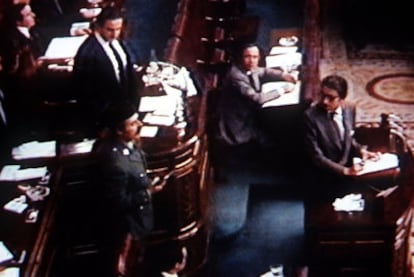"Get on the ground!"
Journalists got a frontline view of the action in Congress on that fateful evening
It's been 30 years now, and it's still impossible to forget. Myself and several other journalists were at Congress for the investiture vote that would usher in Leopoldo Calvo Sotelo as prime minister. Suddenly, we heard voices and noises outside the room, in the corridors.
The floor fell silent, and at exactly 6.23pm, the unmistakable figure of the mustachioed Antonio Tejero stormed in, wielding a pistol, before issuing the following order: "Everybody quiet!"
Those of us sitting in the press area looked at each other. Nobody said a word, nobody wrote down a word. We could not believe that Tejero and his men had managed to make it all the way through Congress and into the main chamber - a chamber that should be impenetrable, like a panic room, isolated from any such assault.
Those of us in the press area looked at each other. Nobody said a word
The sense that we could be killed at any moment was almost palpable
And then came those immortal words: "Get on the ground, everybody!"
Outgoing Prime Minister Adolfo Suárez, his deputy, General Gutiérrez Mellado, and Communist Party leader Santiago Carrillo refused to obey the command. Gutiérrez stood up and told Tejero and his men to lay down their guns, which prompted them to fire rounds into the air, several of them slamming into the paneling just inches from the press box.
By now, we had taken refuge under the chairs and tables around us. The sense that we could be killed at any moment was almost palpable as we crouched in the silence that followed. Initially we were able to see what was going on thanks to a camera focused on the rostrum now occupied by Tejero. Eventually, the deputies slowly began to emerge from their hiding places and take their seats, many lighting up cigarettes in a bid to calm their nerves.
One of the soldiers, who would later be identified as Captain Muñecas, came forward and tried to calm everybody down: "Nothing is going to happen, we are going to wait a few moments until the competent military authority decides what to do... and whatever he says."
Those words, and to whom they might have been referring, have been interpreted, reinterpreted and mulled over for the last 30 years.
An hour later, at 7.30pm, we were escorted out of the chamber by several soldiers. As we emerged onto the pavement outside, free to return to our newspapers, we could see that panic was fast taking over the city. There were long lines of people at the bus stops, eager to get home, there were no taxis on the streets, and shops were closing early. It was as though some terrible noxious gas from the days of Franco was coming up through the drains.
Looking back now, and at a time when the Egyptians and Tunisians have taken to the streets to overthrow decades of repression, there is a sense of shame at the failure at the time of the Spanish people to respond to a coup that, in the words of the poet Celso Emilio Ferreiro, was about to return us to a long, dark stone age.
There were no cellphones, there was no Facebook, and no Twitter. Only fear.

Tu suscripción se está usando en otro dispositivo
¿Quieres añadir otro usuario a tu suscripción?
Si continúas leyendo en este dispositivo, no se podrá leer en el otro.
FlechaTu suscripción se está usando en otro dispositivo y solo puedes acceder a EL PAÍS desde un dispositivo a la vez.
Si quieres compartir tu cuenta, cambia tu suscripción a la modalidad Premium, así podrás añadir otro usuario. Cada uno accederá con su propia cuenta de email, lo que os permitirá personalizar vuestra experiencia en EL PAÍS.
¿Tienes una suscripción de empresa? Accede aquí para contratar más cuentas.
En el caso de no saber quién está usando tu cuenta, te recomendamos cambiar tu contraseña aquí.
Si decides continuar compartiendo tu cuenta, este mensaje se mostrará en tu dispositivo y en el de la otra persona que está usando tu cuenta de forma indefinida, afectando a tu experiencia de lectura. Puedes consultar aquí los términos y condiciones de la suscripción digital.








































